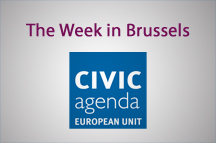Financial squabbles continue as the EU’s most vocal digital champion hangs up her guns and a new Commission prepares for battle
 This week marks the end of an era in Brussels as the Barroso Commission packs up its belongings to make way for the new College of Commissioners under Jean-Claude Junker to take up residence in the Berlaymont Building on November 1st. Against the backdrop of this transition, a political firestorm continues to rage in London over the outgoing Commission’s announcement last week that the UK will need to pay a €2.1 billion surcharge by December 1st (other large EU budget contributors, France and Germany will receive respective rebates of €1 billion and €780 million).
This week marks the end of an era in Brussels as the Barroso Commission packs up its belongings to make way for the new College of Commissioners under Jean-Claude Junker to take up residence in the Berlaymont Building on November 1st. Against the backdrop of this transition, a political firestorm continues to rage in London over the outgoing Commission’s announcement last week that the UK will need to pay a €2.1 billion surcharge by December 1st (other large EU budget contributors, France and Germany will receive respective rebates of €1 billion and €780 million).
On the surface these calculations should be uncontroversial, given they are based on the EU’s budget rules which have already been pre-agreed by all Member States. However, with UK Prime Minister David Cameron under pressure to protect his electoral right flank from a decidedly thorn-like Europhobic insurgency from the UK Independence Party, the timing of this EU surcharge is politically unfortunate.
.jpg) Perhaps unsurprisingly, the UK’s internal political challenges have not been met with universal sympathy in Brussels. At a dinner with journalists on Monday evening, outgoing Trade Commissioner, Karel De Gucht described London’s recent grandstanding over the surcharge as “politics at the level of a small village” and continued by suggesting that “when you have been an empire, it’s many steps down.”
Perhaps unsurprisingly, the UK’s internal political challenges have not been met with universal sympathy in Brussels. At a dinner with journalists on Monday evening, outgoing Trade Commissioner, Karel De Gucht described London’s recent grandstanding over the surcharge as “politics at the level of a small village” and continued by suggesting that “when you have been an empire, it’s many steps down.”
In contrast, on Wednesday the Commission elected to defuse a dramatic showdown with a large EU Member State by deciding not to request revisions to France’s 2015 budget despite its breach of the Eurozone’s deficit rules (a projected deficit of 4.3% of GDP in 2015 compared to the agreed target of 3%). In the end, France’s Finance Minister, Michel Sapin assured the Commission that he would raise an additional €3.6 billion in revenues next year, cutting the French budget deficit to 4.1% in 2015. This compromise is unlikely to delight smaller EU Member States who have been previously compelled by the Commission to implement far more stringent cuts to their national budgets under arguably more adverse circumstances.
 This week will also see the departure of a Vice President Neelie Kroes, a longstanding and battle-worn champion of the EU Digital Agenda and the division of her present responsibilities between two new digital Commissioners, former Estonian Prime Minister Andrus Ansip (the new Vice President for the Digital Single Market) and former EU Energy Commissioner Günther Oettinger (the new Commissioner for Digital Economy and Society).
This week will also see the departure of a Vice President Neelie Kroes, a longstanding and battle-worn champion of the EU Digital Agenda and the division of her present responsibilities between two new digital Commissioners, former Estonian Prime Minister Andrus Ansip (the new Vice President for the Digital Single Market) and former EU Energy Commissioner Günther Oettinger (the new Commissioner for Digital Economy and Society).
Last week in Amsterdam, during one of the final speeches of her Vice Presidency, Neelie Kroes warned against the emergence of “two Europes” – one full of energy and digital ideas, the other trapped in an analogue mind set and fearful of a looming digital future. In a context where access to broadband infrastructure and a rising digital skills deficit form a key part of the dividing wall between European digital haves and have nots – the outputs from next week’s 6th European Congress on E-Inclusion at the EESC in Brussels should offer the incoming Digital Commissioners some additional food for thought on this important subject.














